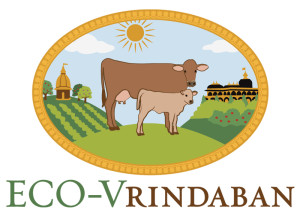Nitaicandra Das Becomes ECO-Vrindaban’s Ox and Agriculture Manager
Nitaicandra Das has always sought the simple life. It was while living in the forests of Trinidad, remarkably enough, that he received a copy of Srila Prabhupada’s “Science of Self-Realization.”
“Living off the forest wasn’t working out for me,” he says. “And once I read Prabhupada’s book I realized, ‘This is it, it’s all here – this society can fulfill my need to live simply.’”
As an ISKCON devotee, Nitaicandra has been growing organic vegetables for around twenty years, including previous stints at New Vrindaban in 1993 and 1999.
For the past four years, he and his wife Sri Tulasi Manjari were caretakers at the ISKCON Escondido farm in California, supplying the San Diego and Laguna Beach temples with flowers, protected cow milk, and thirty different varieties of vegetables.
“At peak time in the summer,” he says, “We were providing the two temples with about 300 pounds of vegetables, 2,000 flowers – mostly marigolds – and 42 gallons of milk per week.”
From his construction and remodeling business, Nitaicandra also feels that he brings a knack for problem-solving – and a lot of experience working with different types of people – to his new role as ECO-Vrindaban’s ox training and local agriculture manager in New Vrindaban.
But perhaps most importantly, he brings a real love for Srila Prabhupada’s first farm project. He’s pumped about the exciting new energy flowing through the community, and glad to get the opportunity to serve in New Vrindaban once again. It is, after all, home to his guru Varsana Swami, who initiated both him and his wife on Nityananda’s Appearance Day in 2014.
Nitaicandra has moved on his own for now, while Sri Tulasi Manjari – who is an advisor to the board of ECO-Vrindaban – stays in California to see their daughter Syama Sundari through her last year of high school and off to college, like her older sister Gaurangi. After that, Sri Tulasi and their fourteen-year-old son Sri Gopa Vallabha (aka Gopa) will move to New Vrindaban next summer.
Meanwhile Nitaicandra – always the hands-on type – started his new service during the second week of September, and is already out working with the ECO-V crew who have been training the oxen.
“It’s a long process,” he says. “It takes a few years to get them into the fields and working.”
Then there’s the local agriculture, which he sees as interconnected and working cohesively with the ox program. Food production, of course, is interdependent with the ISKCON New Vrindaban Deity, devotee, and restaurant kitchens, whose staff Nitaicandra hopes to develop and maintain a close relationship with.
“I’ll be working with them to find out what they need, and will try to supplement the produce they’re using,” he says.
He also hopes to collaborate on developing a menu more suited to local and seasonal crops, although he says that this will take some time as it will require a gradual cultural shift.
In the long term, the goal is to provide ISKCON New Vrindaban’s presiding Deities and residents with most of their fresh vegetables throughout the growing season, and to preserve enough by canning, freezing and drying to meet much of their needs during the winter too.
Finally, Nitaicandra will also be overseeing the flower gardens, which are providing more and more of the flowers used to decorate the Deities during the growing seasons.
He is excited about everything that’s ahead of him.
“When I hear about what the pioneer devotees did here, how pleased Srila Prabhupada was with this project, and how much he loves New Vrindaban – that’s what gives me enthusiasm,” he says. “So I’m just really happy to have this opportunity, and I hope that others will also be inspired to come to New Vrindaban, live simply, help with growing our own food and make a go at it.”






